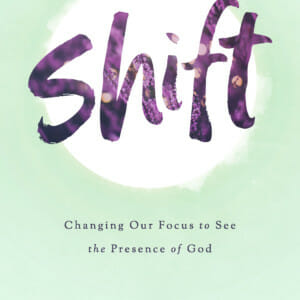Have you ever been there? You open up to someone and let him or her into vulnerable parts of your life, but they misunderstand you. Or you share your story with a new friend you trust but then discover this person isn’t as trustworthy as you thought. When our hearts feel broken, our instinct is often to go on the defensive. But often, in doing so, we only delay the pain instead of healing it. We bury our hurt until a later interaction or situation resurrects it, and it comes back stronger than before.
So what do we do? How can we move forward when the pain is still raw? Instead of burying our feelings, here are three things we can do for our heart when it feels broken:
1. Be honest with God about it.
When we’re hurting, it can be tempting to withdraw and keep to ourselves. We already feel vulnerable, so getting real about our feelings may seem risky. We don’t want to open ourselves up to more hurt or to more opportunities for our hearts to be broken. But friends, God knows our pain better than anyone. Those closest to him betrayed him, and he suffered more than us all. We can be transparent with him about our emotions because he understands each and every one of them. He became human so that he would know not only what we go through but so we could have a relationship with him and come before him without any shame, embarrassment, or hindrance.
For we do not have a great high priest who is unable to empathize with our weaknesses, but we have one who has been tempted in every way, just as we are—yet he did not sin. Let us then approach God’s throne of grace with confidence, so that we may receive mercy and find grace to help us in our time of need.” Hebrews 4:14-16 NIV
When we share our pain with him, something beautiful happens. God heals our hearts and pours out his love in ways only he can. But he won’t force his way into our situation. We have to invite him into it. It’s then that we see him working in tangible ways and are able to experience his mercy and compassion on a different level because we’ve walked through the valley with him.
2. Give yourself time to heal.
We live in a culture that seeks a fast track for everything. Whether it’s a twenty-minute meal, a two-week diet plan, or Prime shipping, we are always after the quickest way to get what we want. But healing isn’t something we can fast-track. Our hearts need time, and there is no timeline for wholeness. One of the best things we can do when our hearts are broken is not rush the healing process and acknowledge that we are human. God created us with emotions, and when we declared his creation as “good” in Genesis, he didn’t overlook this fact.
The writer of Ecclesiastes recognized our humanness, and Ecclesiastes 3 tells us there is a time for everything, including our sorrow:
There is a time for everything,
and a season for every activity under the heavens:a time to weep and a time to laugh,
a time to mourn and a time to dance,” Ecclesiastes 3:1,4 NIV
Although the writer is not specific about the amount of time given to each activity, he does say each of these things is given a “season.” In other words, the pain and sorrow will not last forever. Dancing and laughing will come again, but first, we need to acknowledge our current season. It may not be one we wanted or foresaw, but it is part of our story too. And when we’re present for the season of grief, we can be present for the rejoicing as well.
3. Remember God’s past faithfulness.
When we’re walking through a difficult season, it can be easy to think God has abandoned us. We may forget the many times God delivered us in the past and wonder why he would allow us to walk through the circumstances we face. Scripture contains numerous examples of followers of Jesus who questioned God during trials. Even John the Baptist, who paved the way for Jesus and declared him the Messiah, experienced doubt. During his imprisonment and sent this message to Jesus, “Are you the one who is to come, or should we expect someone else?” (Matthew 11:3)
Our tendency to doubt is one reason it is crucial for us to create reminders of God’s faithfulness. In the Old Testament, the people of Israel built altars, gave God new names, and recorded his deliverance in writing. In the New Testament, the disciples and apostles told stories, recorded miracles, and wrote letters. These practices helped them remember everything God had said and done, and they persevered in the face of persecution and hardship.
Jesus knew the disciples’ hearts would be hurting after he was crucified and knew they would have questions. This is one of the reasons he taught them, ate with them, and prayed for them the night before his death. During the Last Supper, he tells the disciples to do something that will repeatedly refocus their hearts on him in the days ahead: remember.
And he took bread, and when he had given thanks, he broke it and gave it to them, saying, “This is my body, which is given for you. Do this in remembrance of me.”” Luke 22:19 ESV
Jesus was intentional about each and every command he gave through his Word. When he told his disciples to break bread and remember, he knew this regular practice would keep their hearts in tune with his. Each time we partake in communion, we remember that he paid the highest price so that he could walk with us not only through the celebrations and the joyful moments in life but the heartache as well.
After some time mulling over the text conversation with my family member, I brought my hurt to God.
I was honest with him about my feelings and my fears and let out some healing tears over the situation. Although my heart wasn’t immediately healed, and I knew I would have to face my family member later, God brought back memories of his faithfulness during similar circumstances in the past. He also brought an understanding and empathy I didn’t have before letting him in, and I realized I didn’t have to walk through pain alone. God knew, and he was my Defender. His grace was sufficient even at my weakest point, and he gave me an inexplicable peace as I prepared for the day ahead.
Friend, I don’t know what pain you’re walking through today, but I do know this: God sees. He cares about each and every tear you’ve shed, and he wants to walk with you through it. He desires a relationship with you so much that he laid down his life for you, but a relationship is a reciprocal exchange.
Let him know what’s burdening your heart today. Instead of burying your feelings, bring them to him. No matter what lies ahead, he is already there for it. And when you invite him in, his Light makes the view so much more hopeful.
This is an updated edition of a post originally published on Abby McDonald.
Featured Image by Aliko Sunawang from Pixabay






[…] Open the full article on the kingdomwinds.com site […]